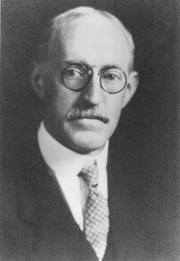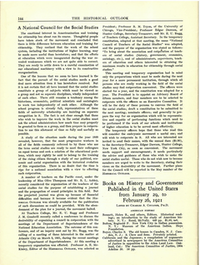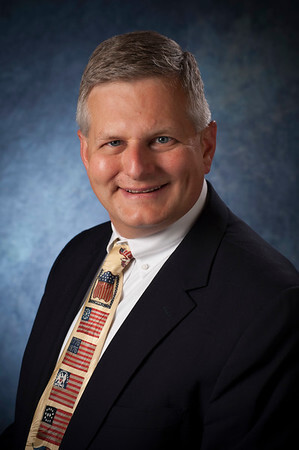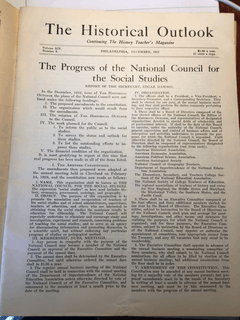NCSS Turns 100!
NCSS Turns 100!
Thursday, March 3, 1921
On this date, a century ago today, educators from Teachers College at Columbia University “called a conference to discuss the desirability of organizing a council in cooperation with the meetings of the Department of Superintendence of the National Education Association.”
There were three outcomes from that first meeting:
- A temporary constitution and name were adopted: “National Council of Teachers of Social Studies.”
- An organizational purpose was established: “To bring about the association and cooperation of teachers of social studies (history, government, economics, sociology, etc.), and of administrators, supervisors, teachers of education and others interested in obtaining the maximum results in education for citizenship through social studies.
Ibid. ” - Four officers were selected. Albert E. McKinley, editor of The Historical Outlook (the predecessor of our current Social Education journal), was the first President.

Following the first meeting, the officers and members of NCSS worked hard to launch a national professional association around a clear vision of the social studies as a united school subject of related academic disciplines. As noted during that first meeting, scholars in these different disciplines tended to work separately from each other and push for separate study of their disciplines in K-12 classrooms. “The fact is not clear enough that those who wish to improve the work in the social studies must ask the school administrators how much time may properly be granted to them as a group, and then prepare in cooperation to use this allotment of time as fully and usefully as possible.
History seldom provides a neat and exact start date for most stories; in many respects, the story of the birthdate of NCSS is no exception. The ideas and vision for a national professional association in the social studies were catalyzed over a decade earlier – just as the debates over the various social studies disciplines in the school curriculum existed well into the previous century. The Historical Outlook, the first NCSS journal, was itself the continuation of a previous journal, The History Teacher’s Magazine, which began publication in September 1909. On the cover of its first issue, the magazine described its purpose as the following:
“The History Teacher’s Magazine is devoted to the interests of teachers of History, Civics, and related subjects in the fields of Geography and Economics. It aims to bring to the teacher of these topics the latest news of his profession. It will describe recent methods of history teaching, and such experiments as may be tried by teachers in different parts of the country. It will keep the teacher in touch with the recent literature of history by giving an impartial judgment upon recent textbooks. It will give announcements of meetings of Teachers’ Associations and accounts of their work. Its columns being open to the questions and contributions of every history teacher, it will serve as a clearing-house of ideas and ideals in the profession of history teaching."
“Announcements for 1909-1910.” The History Teacher’s Magazine 1, no. 1 (1909): 1. Available at: https://babel.hathitrust.org/cgi/pt?id=hvd.32044089885693&view=1up&seq=7.
 This introduction highlights the acknowledged importance of connecting educators to information, resources, ideas, and each other through published content and regular meetings – foundations upon which NCSS was built a decade later. Prior to the “first meeting” of NCSS in Atlantic City, teachers on the West Coast also “considered the organization of the teachers of the social studies for the purpose of establishing a journal and the propagation of sound principles in this field.”
This introduction highlights the acknowledged importance of connecting educators to information, resources, ideas, and each other through published content and regular meetings – foundations upon which NCSS was built a decade later. Prior to the “first meeting” of NCSS in Atlantic City, teachers on the West Coast also “considered the organization of the teachers of the social studies for the purpose of establishing a journal and the propagation of sound principles in this field.”
By December 1923, progress was made in fully establishing NCSS by mobilizing educators across the country. A full constitution was printed in The Historical Outlook, which outlined a Board of Directors representing the major professional associations of specific social studies disciplines, National Education Association departments, and “the regional associations of teachers of history and civics.”
NCSS began those early years as a department of the National Education Association, and this relationship continued into the late 1960s. Initially, NCSS was closely aligned to the American Historical Association (AHA), from which many of its earliest leaders came. It is important to note how NCSS’s earliest years were defined by its direct link to the AHA: The Historical Outlook journal was paid for by the AHA (not directly owned by NCSS), and its editor (our first President) was an AHA committee leader. “The first NCSS yearbooks, beginning in 1922, were published as part of [that] journal, not as separate publications, and NCSS did not hold an independent meeting” separate from the AHA until 1935.
Wednesday, March 3, 2021
Today, we proudly launch our Centennial Celebration in full. Over the course of our Celebration, we will hear from current, past, and future NCSS leaders about their experiences in NCSS leadership and service, and their vision for our profession and association. We will unearth some special treats from our publications archives. When we are back in our physical office more regularly, I plan to unearth some treasures from our publications library, which encompasses an entire century of record, and to share new insights about our history.
To start, if you seek a primer on our “early years” (defined as 1921-1937, the year in which Social Education was established as an independent journal), check out a comprehensive article featured in a special 75th anniversary issue of Social Education published in 1995. A full digital version of the 75th anniversary issue is also available.
It’s clear that, befitting an organization founded on the premise of uniting related academic disciplines together under a common purpose, our birthday can be seen as both March 3, 1921 and at other points in time. Our understanding of social studies’ earliest years, and the evolution of NCSS in response to a national need for an organized approach to the social studies disciplines, continues to deepen. I’m excited to broaden our collective understanding of why social studies continues to be the foundation of a well-rounded education in the 21st century through our Centennial Celebration.
For our 100th year, NCSS is planning two major conferences: our 101st Annual Conference in Minneapolis (November 19-21) and our Centennial Conference in Washington, DC (December 10-12). We continue to provide our award-winning flagship journal, Social Education, now in its 85th year of continuous publication. We also support two other journals for educators: Social Studies and the Young Learner and Middle Level Learning. Our College and University Faculty Assembly (an NCSS Associated Group) publishes Theory and Research in Social Education, the premiere peer-reviewed empirical research journal in our profession.
Perhaps our biggest innovation that would be unknown to our founders is our active online learning program, which includes new webinars added weekly, an on-demand video library, and full teaching institutes and workshops conducted fully via computer.
Monday, March 3, 2121
How will future educators and the general public see NCSS a century from now? How will they view our profession’s response to the issues that face educators, students, and our country? How will they view our work to ensure that social studies remains a core academic subject in the P-12 classroom? The professional learner in me is fascinated to consider how educators will be served by our association in the century to come, and how our conferences, programs, publications, and services will continue to evolve and incorporate new technologies we have yet to imagine.
Welcome to the NCSS Centennial Celebration!

Lawrence M. Paska, Ph.D.
Executive Director
March 3, 2021


